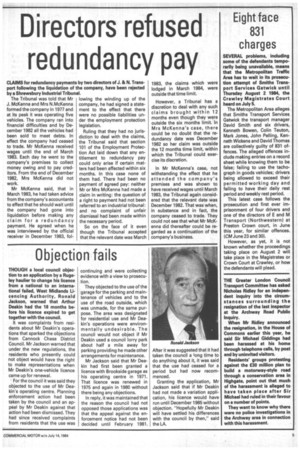Directors refused redundancy pay
Page 7

If you've noticed an error in this article please click here to report it so we can fix it.
CLAIMS for redundancy payments by two directors of J. & N. Transport following the liquidation of the company, have been rejected by a Shrewsbury Industrial Tribunal.
The Tribunal was told that Mr J. McKenna and Mrs N.McKenna formed the company in 1977 and at its peak it was operating five vehicles. The company ran into financial difficulties and by December 1982 all the vehicles had been sold to meet debts. In effect the company had ceased to trade. Mr McKenna received wages until the end of March 1983. Each day he went to the company's premises to collect money owing and to pay creditors. From the end of December 1982, Mrs McKenna did not work.
Mr McKenna said, that in March 1983, he had taken advice from the company's accountants to effect that he should wait until the company had gone into liquidation before making any claim for a redundancy payment. He agreed when he was interviewed by the official receiver in December 1983, fol lowing the winding up of the company, he had signed a statement to the effect that there were no possible liabilities under the employment protection legislation.
Ruling that they had no jurisdiction to deal with the claims, the Tribunal said that section 101 of the Employment Protection Act laid down that any entitlement to redundancy pay could only arise if certain matters had been affected within six months. In this case none of them had. There had been no payment of agreed pay: neither Mr or Mrs McKenna had made a claim in writing: the question of a right to payment had not been referred to an industrial tribunal: and no complaint of unfair dismissal had been made within the necessary period.
So on the face of it even though the Tribunal accepted that the relevant date was March 1983, the claims which were lodged in March 1984, were outside that time limit.
However, a Tribunal has a discretion to deal with any such claims brought within 12 months even though they were outside the six months limit. In Mrs McKenna's case, there could be no doubt that the redundancy date was December 1982 so her claim was outside the 12 months time limit, within which the Tribunal could exercise its discretion.
In Mr McKenna's case, not withstanding the effect that he attended the company's premises and was shown to have received wages until March 1983, the Tribunal again considered that the relevant date was December 1982. That was when, in substance and in fact, the company ceased to trade. They could not see that what Mr McKenna did thereafter could be regarded as a continuation of the company's business.
























































































